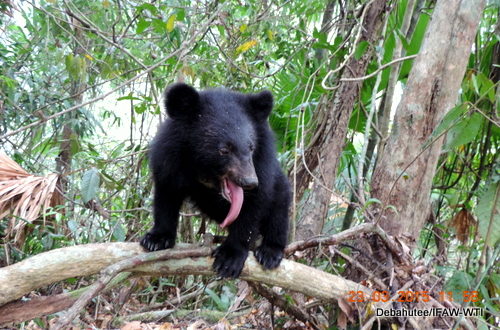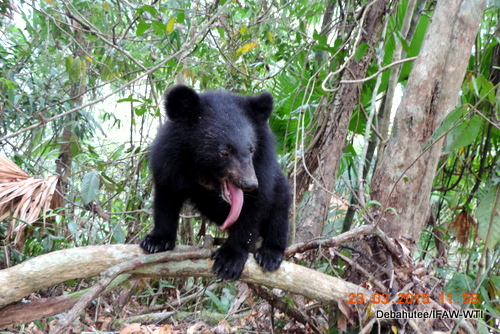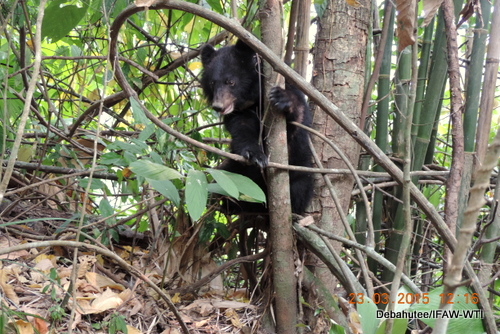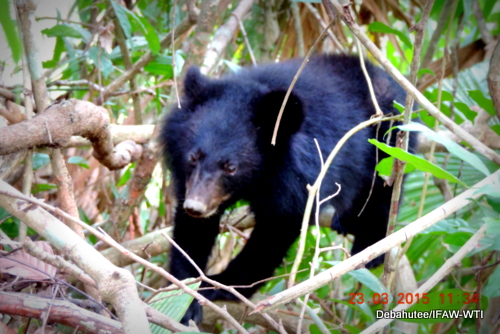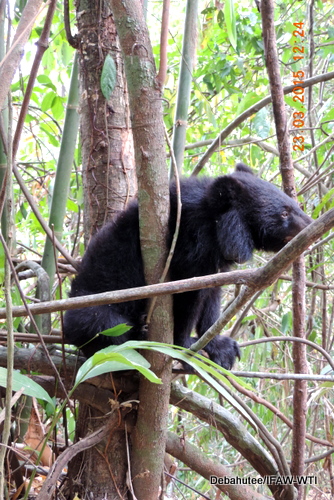Walk On
Blog by Debahutee Roy
On a chilly March evening, we decided to take Bizoo, a hand-raised bear, for a walk in the forest next day. Bizoo is almost one-year-old. Born in captivity in IFAW-WTI run Center for Bear Rehabilitation and Conservation, Bizoo was raised by his mother. During his early years, I am told that he was shy and would rarely interact with humans.
However, of late, he has been displaying aggressive behaviour which has had the entire IFAW-WTI team worried. After long discussions, it was decided that the time is right to release the bear into the wild. But, before he is released, he needs to be acclimatized to the wild and that would mean taking him for long walks in the forest. Bear rehabilitation involves these walks that are part of the soft release exercise. This excursion was part of the same exercise.
To ensure that we woke up before the sunrise, we retired early that evening. We woke up at 5:30 am and had a quick breakfast. Soon after, we approached Bizoo’s cage and saw him still lazing around. Me and an IFAW-WTI animal keeper walked towards Bizoo and offered him some fruits so that he emerges out of the cage and climbs down the machan for a walk in the forest.
But, Bizoo seemed frightened. He would follow us till the stairs and then look down and bolt back into his cage. This continued till 12:30 pm and by now we were exhausted by this never ending ordeal.
Usually, bear cubs hand-raised by animal keepers are not as shy as Bizoo and experts attribute this behaviour to insufficient habituation to a keeper. After all, he has been raised by his mother and not animal keepers which resulted in limited interactions with humans. Experts believe that this could be one of the reasons why he was avoiding us.
At somewhere around 1:00 pm, four of us went up to the machan and when Bizoo walked out of the cage, we immediately shut the door. With nowhere else to go, Bizoo seemed confused and kept staring at the cage for a while. He became restless and tried climbing trees for a while. Suddenly, while climbing one of the trees, he lost his foothold and crashed onto the ground. This was a turning point for Bizoo who seemed to have overcome his fear with the fall.
Bizoo then got up on his legs and playfully ran towards the nearby river and started to swim. He got himself dirty in the mud, got back into the river and ran around like there was no tomorrow. He would climb trees, dig earth and his actions were quite similar to that of a child who has just learnt to walk.
Gradually, he moved some 70 meters away from the cage and started to savour his wild surroundings. We kept following him and after a while just sat in a corner watching Bizoo explore Mother Nature. Soon, he ran deep into the forest, but we could still see him from a distance. However, he couldn’t spot us as we were sitting in a thick undergrowth of grass.
This made him nervous and just like a child he ran back towards us to ensure we were around. Once he spotted us, he just stopped and kept staring at us. I guess this was his way of telling us that we need to follow him. We obliged and followed him and he was again at his playful best. This was unusual. Usually, it’s the animal keeper who takes bears for walks, but Bizoo had other plans. It was he who was taking us for a walk!
Despite that, we followed him for a while and again hid behind a bush, and yet again Bizoo rushed back to look for us. I just couldn’t stop smiling and wondering what was going on in Bizoo’s mind. The entire day passed with me and team members playing hide and seek with the bear. Late in the evening, Bizoo seemed tired and took shelter in one of the trees behind his cage. We too were worn out and returned to our field camp.
Next morning, we reached his cage at 5:30 am and Bizoo was still resting in the tree. After half an hour, he leisurely came down and had his share of fruits. Once full, he began exploring a new trail and we started to follow him yet again. Soon, he was in his usual self and started climbing, digging and feeding on some climbers. This continued for five days and on the sixth day he started showing signs of being disturbed by our presence.
It was a sign that it is time for Bizoo to go where he belongs. He belongs to the wild and we were happy that we are ready to return one more bear back into its natural habitat. Till date, IFAW-WTI has hand-raised and released 43 bears back into the wild under the Asiatic Black Bear Rehabilitation and Conservation Project in Assam and Arunachal Pradesh.

